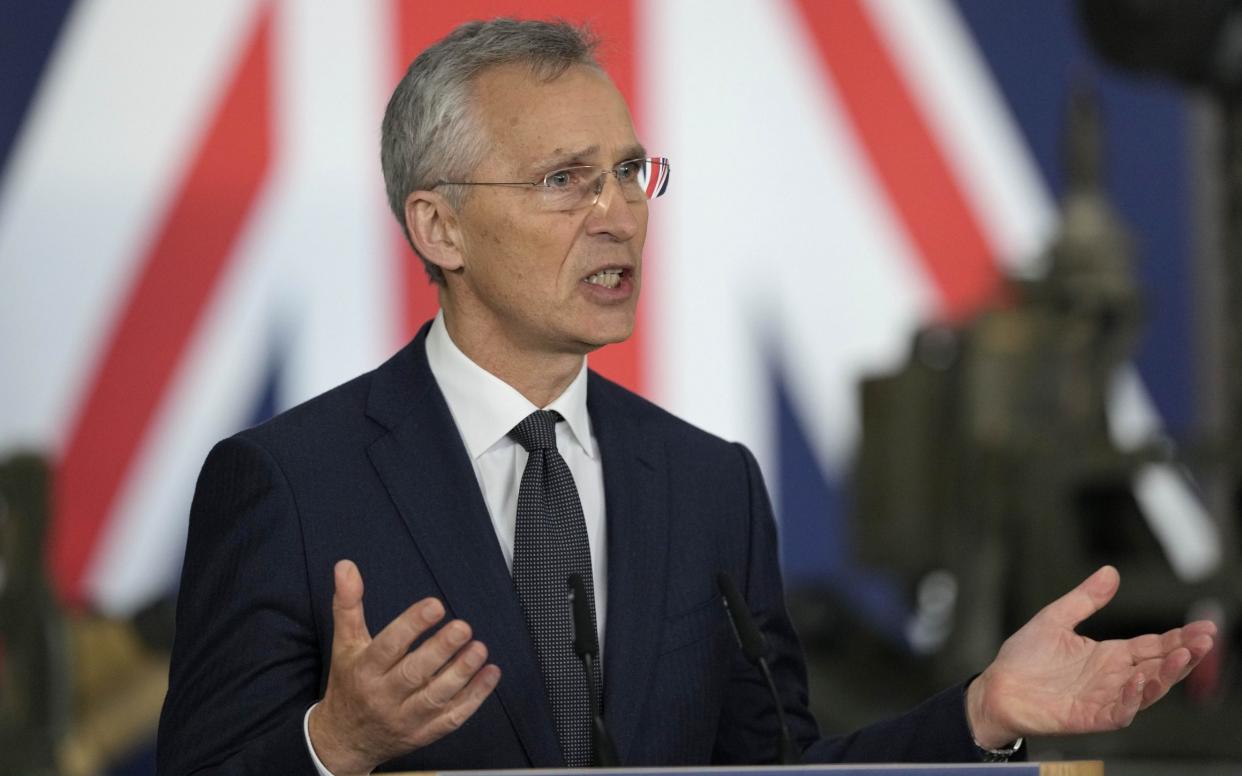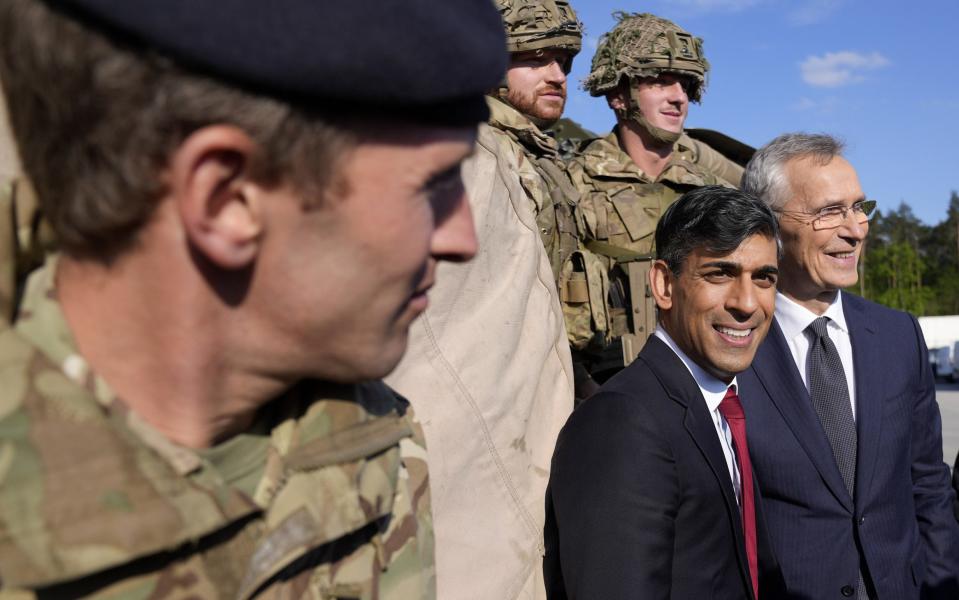Britain leading by example on defence, says Nato chief

- Oops!Something went wrong.Please try again later.
Nato’s most senior official said Britain was leading by example by boosting defence spending, as European allies were under pressure to follow suit.
The pledge by Rishi Sunak will see defence spending increase to 2.5 per cent of gross domestic product (GDP) by 2030, well above the Western military alliance’s 2 per cent spending target.
The Prime Minister announced the uplift at a joint press conference in Warsaw alongside Jens Stoltenberg, the secretary-general of Nato.
“The United Kingdom will spend 2.5 per cent of GDP on defence by 2030,” Mr Stoltenberg told reporters.
“Allies agreed at our summit in Vilnius last year that 2 per cent is a minimum. And, once again, the UK is leading by example.”
The latest spending pledge is likely to result in Britain becoming Nato’s sixth-largest contributor by share of GDP, behind Poland, the United States, Greece, Estonia and Lithuania, according to the figures published in the alliance’s 2023 annual report.
But in terms of total defence expenditure, the country is likely to remain in second place, with only the US spending more and just ahead of Germany.
The announcement was welcomed by the US. A senior American official told The Telegraph: “We have seen allies continue to dig deep to unlock funding for the Ukrainians in their fight for democracy, sovereignty and territorial integrity.
“We are grateful to the UK Government for announcing such tremendous additional support, and this truly goes to show that if President Putin thought we would look away, he was wrong.”
Prof Malcolm Chalmers, the deputy director-general of the Rusi think tank, suggested the British pledge was probably spurred on by Berlin’s “Zeitenwende” decision to overturn decades of neglect of its armed forces with a €100 billion (£86 billion) spending boost.
“The Germans got under the UK Government’s skin. Germany was going to be spending more on defence than the UK [in cash terms]. That’s been quite a powerful factor because we’re used to this image of ourselves as the leading military power in Europe.
“Without this increase, in [cash] spending terms that would no longer have been true,” he added.
Germany’s defence spending could increase to as much as 3.5 per cent of GDP in the coming years, Boris Pistorius, its defence minister, said during a panel discussion at the Munich Security Conference in February.
Mr Sunak will visit Berlin on Wednesday to hold his first meeting with Olaf Scholz, the German Chancellor.
Before the UK announcement, a German defence official was quoted by the Politico news website as saying: “There does not seem to be any plan to increase defence spending at all.
“It has stayed the same for some time... We understand about fiscal constraints the UK has, but we all have the same fiscal constraints.”
Russia’s invasion of Ukraine and the prospect of Donald Trump returning to the White House have put a renewed focus on European defence spending.
Washington has long pushed for Europe to spend more on its own defences.
But Mr Trump claimed in February that he would let Russia do “whatever the hell they want” to alliance members who failed to hit spending targets.
Last year, the US spent two thirds of Nato’s £1 trillion outlay, compared with the £310 billion spent by EU members, the UK and Norway.
Last year, just 11 of Nato’s 32 member states spent the 2 per cent target agreed at summit in Newport in 2014.
More than 20 are expected to meet that goal ahead of a crucial summit in Washington in July, on the eve of the decision to anoint the Republican presidential candidate, where that figure will become a floor and not a ceiling ambition.
There has also been pressure on Europe to offer more support for Ukraine, after Joe Biden struggled to secure backing for a £50 billion military aid package from Republicans who believed the US was doing too much.
Mr Sunak announced a £500 million increase for Kyiv, taking Britain’s contribution to £3 billion, as part of the defence spending pledge.

Volodymyr Zelensky, the Ukrainian president, said it was a “strong determination of support” from the UK.
Mr Stoltenberg said it “makes it possible to deliver more air defence from the United Kingdom to Ukraine that is urgently needed”.
There was a particular focus on EU countries after a meeting of the bloc’s foreign and defence ministers failed to make any substantial pledges of air defence systems, including the US-made Patriot, to Kyiv.
Ursula von der Leyen, the president of the European Commission, promised Mr Biden that Brussels would not rest on its laurels after the US aid package was passed through Congress.
“I told President Biden that this decision will encourage Europe to further step up its own military support for Ukraine,” she told Politico.

